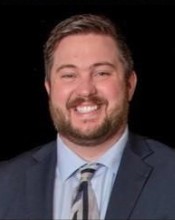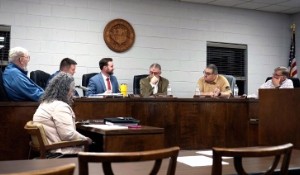|
|

Tim Franklin – Class of 2007
Lead Estimator, Blue Ridge
 Blue Ridge Power is one of the largest independent solar contractors in the United States. The acronym EPC, which is used to describe these types of contractors, stands for Engineering, Procurement, and Construction. These three divisions of the industry must come together to build needed solar farms, the primary source of energy in today’s world. Tim Franklin’s job as the lead estimator for Blue Ridge Power involves collecting information from these three departments and putting it together into an estimate. “After I receive the information from each division,” he explains, “I am able to tell the cost and man hours that it will take to build each project. Then I create a presentation for the company executives who seek to build the solar farm. If they are agreeable with the estimate, Blue Ridge Power then contracts to build the facility.” Blue Ridge Power is one of the largest independent solar contractors in the United States. The acronym EPC, which is used to describe these types of contractors, stands for Engineering, Procurement, and Construction. These three divisions of the industry must come together to build needed solar farms, the primary source of energy in today’s world. Tim Franklin’s job as the lead estimator for Blue Ridge Power involves collecting information from these three departments and putting it together into an estimate. “After I receive the information from each division,” he explains, “I am able to tell the cost and man hours that it will take to build each project. Then I create a presentation for the company executives who seek to build the solar farm. If they are agreeable with the estimate, Blue Ridge Power then contracts to build the facility.”
Before his time with Blue Ridge, Tim had eight years of experience working with wind energy with Sentry Electric Group. “The years 2010 through 2020 were important for wind generated power, and then solar became the more prevalent source. Government tax incentives encouraged companies to move ahead with the new technology, and I believe that the next few decades will see more and more growth involving solar technology.”
Tim’s interest in building was inspired by his father, whose construction company, Burke Development, Inc., managed the water and waste water for all municipalities and counties from Marion to Statesville and from Taylorsville to Forest City. “He worked for years as the director of public works for the town of Long View and then built and operated his own company for more than 20 years. It was a great business, managing millions of dollars in revenue. I began working with my father’s company when I was 16. It was there that I learned about operating a business – everything from engineering drawing to employee relationships and all other aspects of running a company. Burke Development was not only our business, but it was also our family, and I learned to walk the fine line between the two.”
After high school, Tim enrolled in Western Carolina University with the plan to study engineering. But life took a turn, as it has done with so many others. Burke Development was one of many businesses that had to close its doors with the economic downturn in 2008-2010, so Tim came home to help his father. But he continued his studies at Western Piedmont Community College and later returned to Western Carolina. “During this time, my focus changed, and I decided to earn a degree in Political Science with a minor in Economics. In fact, the economic aspect interested me so much that I took extra classes in the subject. These skills have served me well in my career.”
 Before finding his niche in the energy world, Tim worked for a while at the State Employees Credit Union and later with the Burke County Department of Transportation. “I learned from each of these jobs, but neither was a good fit for me. I was fortunate to have the opportunity in 2013 to begin working with wind energy and then in 2022 to move over to solar. I really enjoy working with data, and I especially enjoy telling a story with that data. I find it fascinating that a person can tell entirely different stories with data by changing only one metric. I find it rewarding to question the data that I am given and to find the best way to use money wisely, saving both private businesses and taxpayers from wasting resources and funds. I am energized by the work I do. I know personally that I have to love my work in order to be productive. Life is short; I need to feel fulfilled both by providing for my family and by serving my community through using resources efficiently.” Before finding his niche in the energy world, Tim worked for a while at the State Employees Credit Union and later with the Burke County Department of Transportation. “I learned from each of these jobs, but neither was a good fit for me. I was fortunate to have the opportunity in 2013 to begin working with wind energy and then in 2022 to move over to solar. I really enjoy working with data, and I especially enjoy telling a story with that data. I find it fascinating that a person can tell entirely different stories with data by changing only one metric. I find it rewarding to question the data that I am given and to find the best way to use money wisely, saving both private businesses and taxpayers from wasting resources and funds. I am energized by the work I do. I know personally that I have to love my work in order to be productive. Life is short; I need to feel fulfilled both by providing for my family and by serving my community through using resources efficiently.”
Tim cites his father as his greatest inspiration, but there were others who also influenced him along the way. “Like many teens, I had little direction in high school. I had no idea where I might be going. I found math teacher Horace Brown to be a real calming force. He was able to inspire and direct an aimless young man in a mature and responsible way, and I am grateful for his guidance. My senior English teacher, Tracy Greene, is also memorable. The senior project was a challenging task that required many hours and many steps. At the time I was going through a difficult time at home. My parents were divorcing, and as a result, as one might expect, I was having some difficulty. But Ms. Greene was very empathetic to my situation and allowed me the freedom to do some of my tasks out of bounds and on the timeline that I needed. She was and is a great example of a teacher who understands and cares. I also need to mention my involvement with the Junior ROTC. It is a great program that can help young people practice discipline, responsibility, respect, and punctuality. I still remember Sgt. Major James Wright warning us ‘don’t be late to drill.’
“My biology teacher at Western Piedmont, Michael Spath, encountered me at a time when I was trying to piece my life back together. Our family had lost our business in the financial downturn in 2008-2010, and I needed direction and encouragement. He helped me through this difficult time with both educational and spiritual advice. He was a guide for both school and life. He and his wife are true Christians in every sense of the word, and I appreciate the guidance they gave at a much-needed time. I have only massive respect for them.”
 Tim has a special interest in local government and making life better in small communities. At the beginning of 2024, he took office as an alderman on the Drexel town board and hopes to use his career experience to bring new business and industry to the town. “Many members of the millennial generation would like to see progress made in small towns, but they are unsure about how to accomplish that goal. I encourage them to not be afraid to step out into leadership roles, to become active in local government, and to take an interest in civic duties. We can learn from the previous generations and then move forward into the future with new ideas. Tim has a special interest in local government and making life better in small communities. At the beginning of 2024, he took office as an alderman on the Drexel town board and hopes to use his career experience to bring new business and industry to the town. “Many members of the millennial generation would like to see progress made in small towns, but they are unsure about how to accomplish that goal. I encourage them to not be afraid to step out into leadership roles, to become active in local government, and to take an interest in civic duties. We can learn from the previous generations and then move forward into the future with new ideas.
“It is necessary to ask ourselves what our small communities need in order to attract both residents and visitors. Modern infrastructure is so important. For example, broadband is a huge priority and is badly needed for businesses and for people who work from home. One of my greatest challenges comes when I have prepared an important online presentation for a company only to have my internet service stop. It is distressing to have a group of important business executives waiting for me while I try to reconnect. Fortunately, we have companies who are working toward the goal of bringing broadband to our area, and that alone will make a huge difference.
“My personal goals continue to be to provide well for my own family while helping my community to thrive and progress.” For Tim and for others of his generation who are making a positive difference in the world, the future looks promising. We watch and wait to see the results of their new and exciting ventures.
Published March 2024
Home Page
|
|
|
|